2016春节的英文介绍 英文版祝福语更高大上!

- 编辑:小男
春节即新年,是中国传统的节日,春节还要辞旧迎新,以示万象更新、生机勃勃的新面貌。随着中西方文化的交流融合,现在中国也走国际化路线,春节的英文介绍也随之出现,让我们一起学习下关于春节的英文吧。

春节的英文
春节的英文介绍:
The Spring Festival is the most important festival in China.People usually decorate the doors and windows with red papercuts.becouse red means good luck.People usually clean house too.becouse they want to sweep away bad luck.Children can get some new clothes or presents from their parents and grandparents.
On New Year's Eve,family always have a big dinner.Everybody are watch TV and talk.In the midnight,there usually fairworks.
On New Year's Day,people usually put on their new clothes and visit their femily and friends.They usually say:"Happy New Year's Day."
The Spring Festival finishes at the Lantern Festival after two weeks.People usually eat a kind of rice dumpling called yuanxiao.It can take people good luck all the year round.
The Origin of Chinese New Year
中国春节的来历
The Chinese New Year is now popularly known as the Spring Festival because it starts from the Begining of Spring (the first of the twenty-four terms in coodination with the changes of Nature). Its origin is too old to be traced. Several explanations are hanging around. All agree, however, that the word Nian, which in modern Chinese solely means "year", was originally the name of a monster beast that started to prey on people the night before the beginning of a new year.
One legend goes that the beast Nian had a very big mouth that would swallow a great many people with one bite. People were very scared. One day, an old man came to their rescue, offering to subdue Nian. To Nian he said, "I hear say that you are very capable, but can you swallow the other beasts of prey on earth instead of people who are by no means of your worthy opponents?" So, it did swallow many of the beasts of prey on earth that also harrassed people and their domestic animals from time to time.
After that, the old man disappeared riding the beast Nian. He turned out to be an immortal god. Now that Nian is gone and other beasts of prey are also scared into forests, people begin to enjoy their peaceful life. Before the old man left, he had told people to put up red paper decorations on their windows and doors at each year's end to scare away Nian in case it sneaked back again, because red is the color the beast feared the most.
From then on, the tradition of observing the conquest of Nian is carried on from generation to generation. The term "Guo Nian", which may mean "Survive the Nian" becomes today "Celebrate the (New) Year" as the word "guo" in Chinese having both the meaning of "pass-over" and "observe". The custom of putting up red paper and firing fire-crackers to scare away Nian should it have a chance to run loose is still around. However, people today have long forgotten why they are doing all this, except that they feel the color and the sound add to the excitement of the celebration.
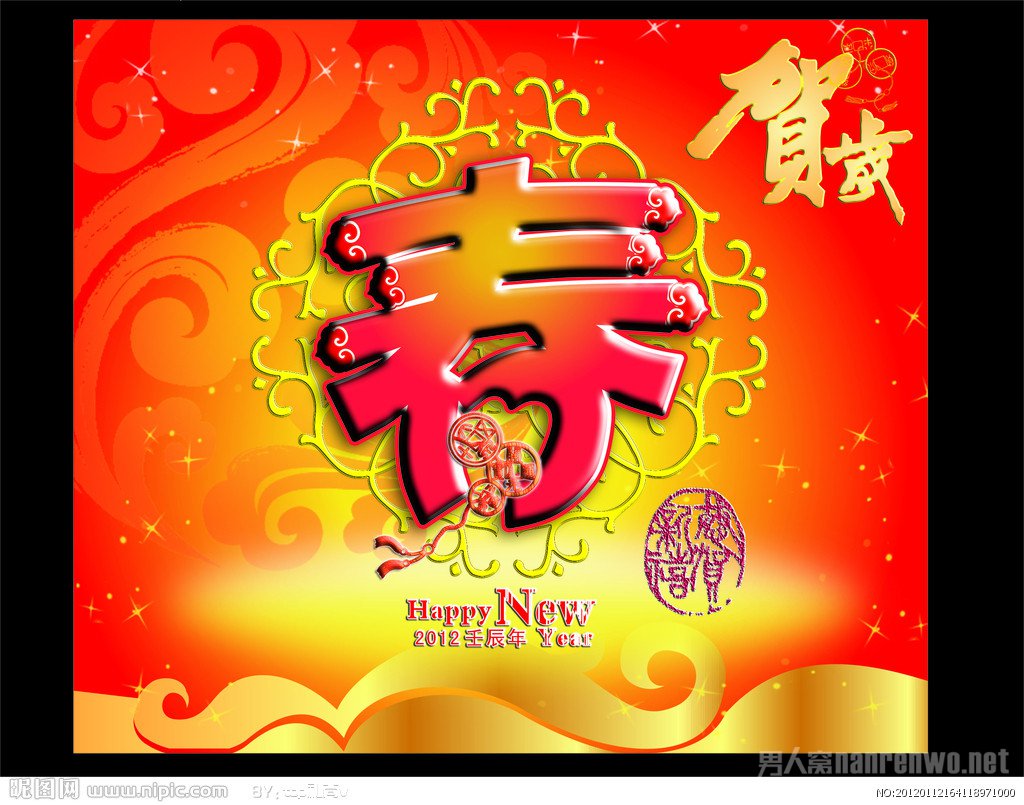
春节的英文常用词语
春节的英文常用词语
过年 Guo-nian; have the Spring Festival
对联 poetic couplet: two successive rhyming lines in poetry
春联 Spring Festival couplets
剪纸 paper-cuts
年画 New Year paintings
买年货 special purchases for the Spring Festival ; do Spring Festival shopping
敬酒 propose a toast
灯笼 lantern: a portable light
灯会 exhibit of lanterns
守岁 staying-up
拜年 pay New Year's call; give New Year's greetings; New Year's visit
禁忌 taboo
去晦气 get rid of the ill- fortune
祭祖宗 offer sacrifices to one's ancestors
压岁钱 gift money; money given to children as a lunar New Year gift
辞旧岁 bid farewell to the old year
扫房 spring cleaning; general house-cleaning
八宝饭 eight treasures rice pudding
糖果盘 candy tray
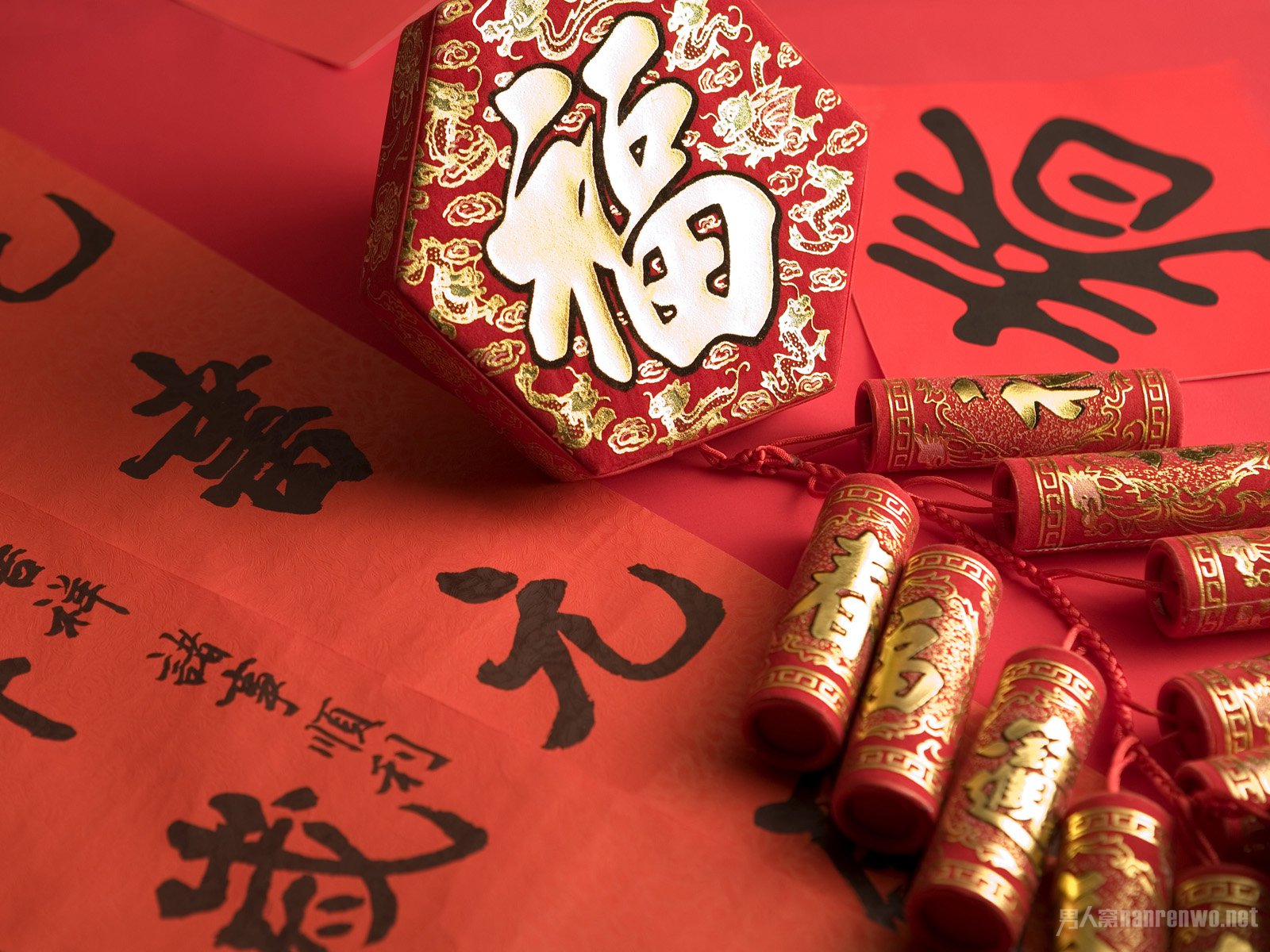
春节的英文大全
什锦糖 assorted candies - sweet and fortune
蜜冬瓜 candied winter melon - growth and good health
西瓜子 red melon seed - joy, happiness, truth and sincerity
金桔 cumquat - prosperity
糖莲子 candied lotus seed - many descendents to come
糖藕 candied lotus root - fulfilling love relationship
红枣 red dates - prosperity
花生糖 peanut candy - sweet
春节正月习俗的英文介绍
The Chinese New Year celebrations are marked by visits to kin, relatives and friends, a practice known as "new-year visits" (Chinese: 拜年; pinyin: bài nián). New clothes are usually worn to signify a new year. The colour red is liberally used in all decorations. Red packets are given to juniors and children by the married and elders. See Symbolism below for more explanation.
Preceding days 春节前
This article does not cite any references or sources.
Please help improve this article by adding citations to reliable sources. Unsourced material may be challenged and removed. (January 2010)
On the days before the New Year celebration Chinese families give their home a thorough cleaning. There is a Cantonese saying "Wash away the dirt on ninyabaat" (年廿八,洗邋遢), but the practice is not usually restricted on nin'ya'baat (年廿八, the 28th day of month 12). It is believed the cleaning sweeps away the bad luck of the preceding year and makes their homes ready for good luck. Brooms and dust pans are put away on the first day so that luck cannot be swept away. Some people give their homes, doors and window-frames a new coat of red paint. Homes are often decorated with paper cutouts of Chinese auspicious phrases and couplets. Purchasing new clothing, shoes, and receiving a hair-cut also symbolize a fresh start.
In many households where Buddhism or Taoism is prevalent, home altars and statues are cleaned thoroughly, and altars that were adorned with decorations from the previous year are also taken down and burned a week before the new year starts, and replaced with new decorations. Taoists (and Buddhists to a lesser extent) will also "send gods" (送神), an example would be burning a paper effigy of Zao Jun the Kitchen God, the recorder of family functions. This is done so that the Kitchen God can report to the Jade Emperor of the family household's transgressions and good deeds. Families often offer sweet foods (such as candy) in order to "bribe" the deities into reporting good things about the family.
The biggest event of any Chinese New Year's Eve is the dinner every family will have. A dish consisting of fish will appear on the tables of Chinese families. It is for display for the New Year's Eve dinner. This meal is comparable to Christmas dinner in the West. In northern China, it is customary to make dumplings (jiaozi 饺子) after dinner and have it around midnight. Dumplings symbolize wealth because their shape is like a Chinese tael. By contrast, in the South, it is customary to make a new year cake (Niangao, 年糕) after dinner and send pieces of it as gifts to relatives and friends in the coming days of the new year. Niangao literally means increasingly prosperous year in year out. After the dinner, some families go to local temples, hours before the new year begins to pray for a prosperous new year by lighting the first incense of the year; however in modern practice, many households hold parties and even hold a countdown to the new lunar year. Beginning in the 1980s, the CCTV New Year's Gala was broadcast four hours before the start of the New Year.
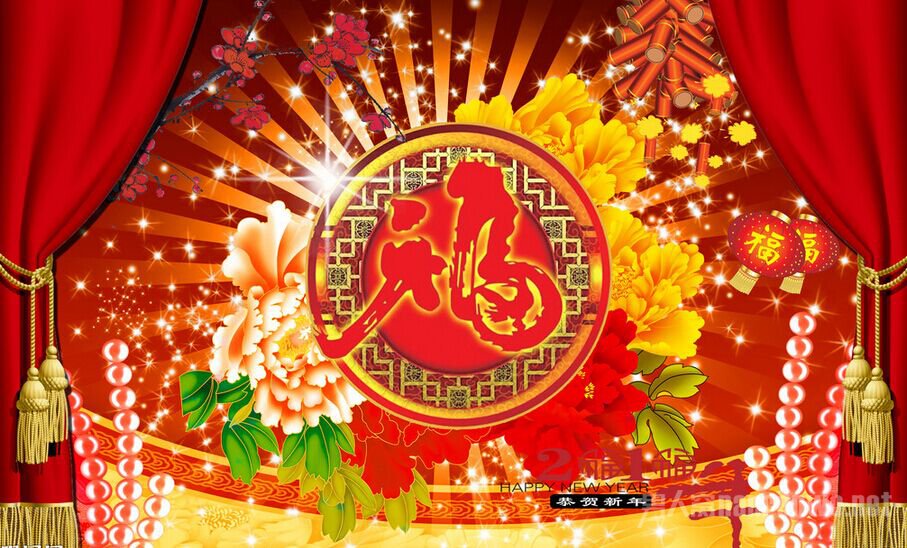
春节正月习俗的英文介绍
First day 初一
The first day is for the welcoming of the deities of the heavens and earth, officially beginning at midnight. Many people, especially Buddhists, abstain from meat consumption on the first day because it is believed that this will ensure longevity for them. Some consider lighting fires and using knives to be bad luck on New Year's Day, so all food to be consumed is cooked the day before. For Buddhists, the first day is also the birthday of Maitreya Bodhisattva (better known as the more familiar Budai Luohan), the Buddha-to-be. People also abstain from killing animals.
Most importantly, the first day of Chinese New Year is a time when families visit the oldest and most senior members of their extended family, usually their parents, grandparents or great-grandparents.
Some families may invite a lion dance troupe as a symbolic ritual to usher in the Lunar New Year as well as to evict bad spirits from the premises. Members of the family who are married also give red packets containing cash to junior members of the family, mostly children and teenagers.
While fireworks and firecrackers are traditionally very popular, some regions have banned them due to concerns over fire hazards, which have resulted in increased number of fires around New Years and challenged municipal fire departments' work capacity. For this reason, various city governments (e.g., Hong Kong, and Beijing, for a number of years) issued bans over fireworks and firecrackers in certain premises of the city. As a substitute, large-scale fireworks have been launched by governments in cities like Hong Kong to offer citizens the experience.
Second day 初二
The second day of the Chinese New Year is for married daughters to visit their birth parents. Traditionally, daughters who have been married may not have the opportunity to visit their birth families frequently.
On the second day, the Chinese pray to their ancestors as well as to all the gods. They are extra kind to dogs and feed them well as it is believed that the second day is the birthday of all dogs.
Business people of the Cantonese dialect group will hold a 'Hoi Nin' prayer to start their business on the 2nd day of Chinese New Year. The prayer is done to pray that they will be blessed with good luck and prosperity in their business for the year.
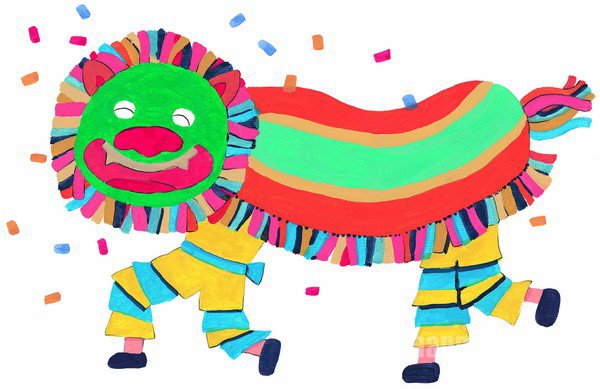
2016春节的英文介绍
Third and fourth days 初三
The third and fourth day of the Chinese New Year are generally accepted as inappropriate days to visit relatives and friends due to the following schools of thought. People may subscribe to one or both thoughts.
1) It is known as "chì kǒu" (赤口), meaning that it is easy to get into arguments. It is suggested that the cause could be the fried food and visiting during the first two days of the New Year celebration.[citation needed]
2) Families who had an immediate kin deceased in the past 3 years will not go house-visiting as a form of respect to the dead, but people may visit them on this day. Some people then conclude that it is inauspicious to do any house visiting at all. The third day of the New Year is allocated to grave-visiting instead.
Fifth day 初五
In northern China, people eat jiǎo zi (simplified Chinese: 饺子; traditional Chinese: 餃子), or dumplings on the morning of Po Wu (破五). This is also the birthday of the Chinese god of wealth. In Taiwan, businesses traditionally re-open on this day, accompanied by firecrackers.
Seventh day 初七
The seventh day, traditionally known as renri 人日, the common man's birthday, the day when everyone grows one year older. It is the day when tossed raw fish salad, yusheng, is eaten. This is a custom primarily among the overseas Chinese in Southeast Asia, such as Malaysia and Singapore. People get together to toss the colourful salad and make wishes for continued wealth and prosperity.
For many Chinese Buddhists, this is another day to avoid meat, the seventh day commemorating the birth of Sakra Devanam Indra.
Eighth day 初八
Another family dinner to celebrate the eve of the birth of the Jade Emperor. However, everybody should be back to work by the 8th day. All of government agencies and business will stop celebrating by the eighth day.
Ninth day 初九
The ninth day of the New Year is a day for Chinese to offer prayers to the Jade Emperor of Heaven (天宮) in the Taoist Pantheon. The ninth day is traditionally the birthday of the Jade Emperor. This day is especially important to Hokkiens. Come midnight of the eighth day of the new year, Hokkiens will offer thanks giving prayers to the Emperor of Heaven. Offerings will include sugarcane as it was the sugarcane that had protected the Hokkiens from certain extermination generations ago. Incense, tea, fruit, vegetarian food or roast pig, and paper gold is served as a customary protocol for paying respect to an honored person.
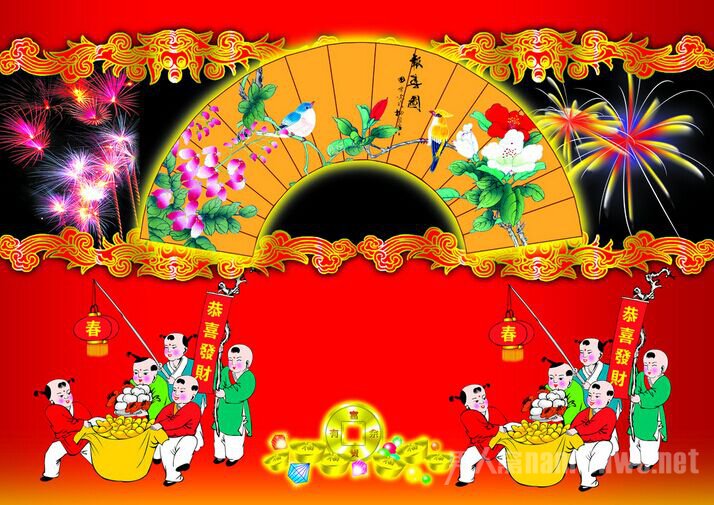
春节的英文
Tenth day 初十
The other day when the Jade Emperor's birthday is celebrated.
Thirteenth day 正月十三
On the 13th day people will eat pure vegetarian food to clean out their stomach due to consuming too much food over the last two weeks.
This day is dedicated to the General Guan Yu, also known as the Chinese God of War. Guan Yu was born in the Han dynasty and is considered the greatest general in Chinese history. He represents loyalty, strength, truth, and justice. According to history, he was tricked by the enemy and was beheaded.
Almost every organization and business in China will pray to Guan Yu on this day. Before his life ended, Guan Yu had won over one hundred battles and that is a goal that all businesses in China want to accomplish. In a way, people look at him as the God of Wealth or the God of Success.
Fifteenth day 正月十五
The fifteenth day of the new year is celebrated as yuán xiāo jié (元宵节), otherwise known as Chap Goh Mei in Fujian dialect. Rice dumplings tangyuan (simplified Chinese: 汤圆; traditional Chinese: 湯圓; pinyin: tāngyuán), a sweet glutinous rice ball brewed in a soup, is eaten this day. Candles are lit outside houses as a way to guide wayward spirits home. This day is celebrated as the Lantern Festival, and families walk the street carrying lighted lanterns.
This day often marks the end of the Chinese New Year festivities.
春节的英文祝福语
给父母亲
Mom and Dad: Thank you for everything this holiday season!
爸爸妈妈:值此佳节,感谢您们所给予的一切。
Warmest thoughts and best wishes from your daughter.
寄上无限的思念和最美好的祝愿,你们的女儿。
May you have the best season ever.
愿你过个最愉快的节日。
A New year greeting to cheer you from your daughter.
愿女儿的祝福带给您欢乐。
Happy New year to the world's best parents!
祝世界上最好的父母节日快乐!
Season's greetings to my dearest parents!
祝我最亲爱的父母节日愉快!
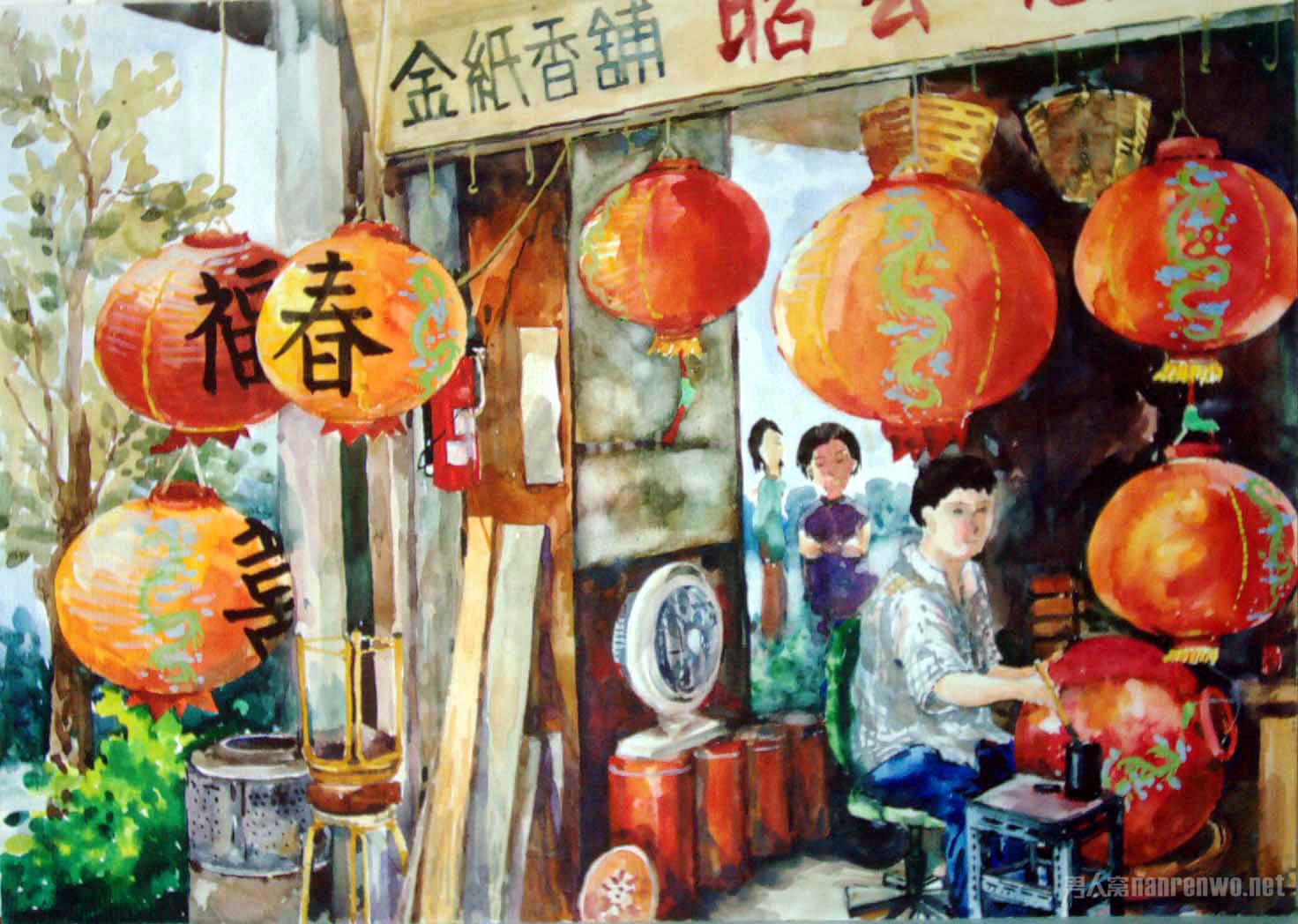
春节的英文祝福语
给师长
Much joy to you in the upcoming year.
愿您在新的一年充满快乐。
Thank you for your hard work and patience on this holiday season.
值此佳节,谨对您的辛勤栽培表示感谢。
May happiness follow you everywhere …just like we do.
愿快乐随时与您同在——如同我们与您寸步不离。
Wishing you and your family a very happy new year.
祝福您及全家新年快乐。
给朋友
A New Year greeting to cheer you, my good friend.
希望新年祝福给你带来欢乐,我的好朋友。
Take your passion and make it come true.
发挥你的热情,让理想变为现实。
Best of luck in the year to come.
愿你在未来的一年里,吉星高照。
Wish all the best wishes for you.
献上最美好的祝愿。
Wish many good wishes for the holidays and the coming year.
新的一年,向你献上最诚挚的祝福。
Wishing you all the blessings of a beautiful season.
愿你拥有美丽的新年所有的祝福。
May its blessings lead into a wonderful year for you and all whom you hold dear.
祝福你及你所爱的人新的一年中万事如意。
To wish you special joy at the holidays and all year.
祝你在节日和新的一年中享有无限的快乐。
关于春节的传说有很多,春节的习俗更是丰富多彩。贴春联、穿新衣、守岁……都是约定俗成的习惯,在这一天大街小巷都热闹非凡,洋溢着欢快的节日气氛。
< 上一篇
下一篇 >
24小时热文 换一换

强东玥公主风写真曝光
最近,一组关于强东玥公主风写真曝光。在写真中我们可以看到强东玥身穿公主风的白色纱裙相当的漂亮,当然在过程中强东玥的笑容才是最迷人的,你们是不是喜欢这样的强东玥呢?
-
盘点素颜好看的女明星
最近,吴昕素颜出镜将大家化妆,而大家也发现,吴昕素颜真的还挺不错的。大家都清楚,化妆跟素颜一定会有差别。在纯素颜的情况下,吴昕还能是这个样子的,也是很棒了。而在娱乐圈中,还有很多素颜也很好看的女明星。今天,就一起来盘点一下娱乐圈中那些素颜好
-
盘点娱乐圈明星子女小名
知道了谢娜双胞胎小公主的小名之后,也是觉得很可爱的。娱乐圈中一些明星给孩子取小名,也已经成为一种潮流了,那么娱乐圈中还有哪些有趣的明星孩子的小名呢?
-
盘点五一旅游最佳去处
五一就要到了,在五一来临之际,不知道你们有没有旅行的计划呢?三天的小长假,其实已经够你出去短途玩一趟了。那么五一有哪些好去处呢?今天就来盘点五一旅游最佳去处。这些有山有海,希望你能玩得尽兴!
-
盘点民国装好看的男星
今日,鹿晗民国装曝光,没想到鹿晗的民国装这么好看。本来就长得很秀气的鹿晗,换上了民国装之后,变得更加有气质。而其实在现在的娱乐圈中,有很多小鲜肉,穿起民国装来还是很不错的,所以今天就来盘点一下娱乐圈中小鲜肉们的民国装。
-
公婆买房要给女儿留房间
最近杭州的一名网友在网上发文,表示自己的公婆买房要给女儿留房间,对此这个儿媳列出了自己的几大看法
-
上课偷拍老师被发现
最近,不少朋友都沉浸在回顾当年青涩校园时光的回忆中,每个人的校园时代总有那么一个长发飘飘的初恋,一个两肋插刀的哥们儿,当然最重要的是还有一个无比逗比的老师。
-
朋友圈点赞最高的神回复
要说这朋友圈也是一个人的社交圈,对于有些朋友来说也同样是个幽默圈。当你一本正经发了条朋友圈,却被脑路大开的朋友玩坏后是什么情景。
-
2018年第一次水逆即将到来
没错,2018年第一次水逆就要来了。3月23日,也就是明天,2018年第一次水逆正式开始。就这样一直持续到4月15日。
-
国庆节手抄报
十一国庆长假来临,2016马年国庆节手抄报内容可以写什么内容呢?国庆节手抄报内容可以有简介、诗歌、古诗和名言警句,当这些资料都找好以后,国庆节手抄报版面要如何排版呢?这里有关于国庆节手抄报图片大全,不妨参考看看。
-
中秋节手抄报资料
农历八月十五中秋节是个团圆的节日,这一天中秋节吃月饼,赏月,送礼物。而很多学生需要绘制中秋节手抄报,那么关于中秋节手抄报有什么内容吗?我们一起来看看中秋节手抄报资料及版面设计。
-
教师节礼物
老师有责任向学生传授知识,他们的勤恳付出,只为了学生能够拥有一个好的将来。今天又是一年一度的教师节,一声老师,幸苦了,一束鲜花,一张贺卡都能够表达对老师的感激。但送礼物是有讲究的,教师节送什么花,教师节送什么礼物好,是一件头疼事情。那么,教师节礼物如何送的有价值有意义呢?
-
七夕情人节礼物
情人节又是虐待单身狗的日子,中国传统节日——七夕情人节到了,你为亲爱的她准备了什么礼物了吗?玫瑰巧克力首饰虽然盛满了爱的心意,但却是老掉牙的套路,没有丝毫创意。那么,什么是最有创意的七夕情人节礼物呢?都看过来吧!

















